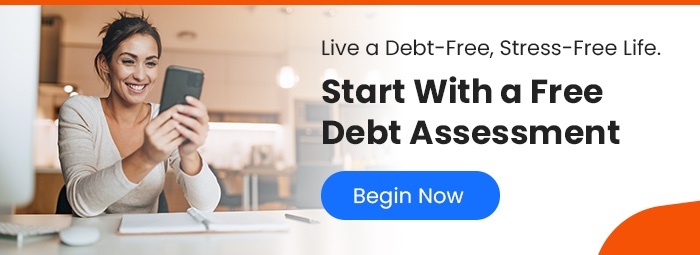
Life with Credit After Divorcing Debt
Paying off your debt is a huge achievement. It can feel a lot like getting out of an unhealthy relationship — freeing, relieved, hopeful for the future. It’s definitely not easy to pay off your debt, but you’ll be much better for it. If you've recently cut ties with your debt, below are your next steps to make a full recovery and regain your financial freedom.
6 Ways to Create a Positive Relationship with your Money
Once you've paid off your debt in full, it’s important to move forward in a positive way that doesn’t put any unnecessary pressure on you. (I’m sure you’re already sleeping better at night, and relieved that those collection calls have finally stopped!) Here are six ways you can start building a positive relationship with credit and your money that moves you towards your financial goals, and so you don't fall back into old habits.
Avoid credit cards (at least for a while) after you have paid off your debt
Just as a marriage counsellor would likely suggest that you don’t rush into another relationship, a certified Credit Counsellor would suggest you don't break out the credit cards just yet. It’s important to know and accept that you can be on your own and that you don’t have to rely on credit. So, make it a goal to only use cash or your debit card for a period of time.
Prevent future debt by accepting some accountability for your past debt
It’s important to acknowledge your role in the relationship you had with your debt. If you continue to blame others, such as thinking “the banks shouldn't have given me those credit cards” you won't be able to move forward in a positive, constructive way. After all, you made the decision to use the cards, despite perhaps knowing you couldn't pay the balance off in full at the end of the month. It is a show of strength to admit you made some mistakes, and that you learned from them, and now you’re ready to make a positive change. For years I've been telling my clients that they can’t change the past—but they can learn from it!
Take control of your finances and have a budget
Learn to handle your money and be in control of your financial life. Yes, this means the “B” word—budgeting! If you don't like the idea of a budget, think of it as a spending plan. And by creating a realistic spending plan, you will know what you can (and can't) afford to spend and thereby avoid having to rely on credit.
Establish a savings plan and savings account
It’s important to regularly put funds away to achieve your goals. Maybe you want to go on a cruise, buy a new car, or redecorate your living room. With proper planning, you can create the savings you need to meet these goals. And your bank or credit union can help make saving easier. If you use online banking, you can set up automatic transfers from your main account to a savings account specifically for the goals you have in mind. You can also go to your bank and ask them to transfer funds each payday to your savings account or TFSA. It might also be a good idea to speak with their investment specialists, so you can learn how you can make your money grow faster and work harder for you. And when you have any extra funds, such as tax returns or overtime pay, squirrel it away into that savings account before you have a chance to spend it.
Know your money-spending triggers and learn to manage them
Scared you'll fall back into old habits? It’s important to know your spending triggers, and avoid them by changing up your routine if you need to. Perhaps this means avoiding the mall when you're feeling down or stressed out. Invite a friend to go for coffee or tea instead. Other people might find that their lunch break is when they spend the most money unnecessarily. Make it a habit to go for a walk instead, or read a book, get in a 30-minute workout, do research for a personal project, or make this your time to catch up with old friends (or your mother), and return those emails you've been putting off. The point is to manage your life in a way so you avoid those triggers that can lead you back into debt.
Be mindful with credit cards when you start to use them again
Once you’re feeling stronger, you may decide you want to start a new relationship with credit cards. But remember, you are in control—not them. Don’t use credit because you don’t have the funds to make the purchase; you want to avoid another toxic relationship! While it can be tempting to make minimum payments only, our Debt Calculator will show you just how long it will take to clear that debt when you only pay the minimum, and how much interest you'll pay. (All of a sudden that top you bought on "sale" can end up costing you three times as much in the interest you'll pay.) So, clear the balance every month and avoid interest charges. You’ll be glad you did! And if you know you can't pay the balance in full at the end of the month—you guessed it—put the credit card down. Remember, credit cards can be a tool that can help build up your credit if you use them wisely; otherwise, they'll make you pay...literally.
Credit Canada is always here to help!
You know the old saying: Today is the first day of the rest of your life. Well, let’s keep it that way if you're now living debt-free! Of course, if you feel you’re slipping up, don’t be afraid to ask for help. Speak with a caring Credit Counsellor by calling 1 (800) 267-2272 and book a free counselling session. It's 100% free and confidential, and our counsellors can help you learn to manage your money, establish goals, take control of your finances, and learn to rebuild your credit. It’s a brand new day, and time to enjoy debt-free living!
Frequently Asked Questions
Have questions? We are here to help
A Debt Consolidation Program (DCP) is an arrangement made between your creditors and a non-profit credit counselling agency. Working with a reputable, non-profit credit counselling agency means a certified Credit Counsellor will negotiate with your creditors on your behalf to drop the interest on your unsecured debts, while also rounding up all your unsecured debts into a single, lower monthly payment. In Canada’s provinces, such as Ontario, these debt payment programs lead to faster debt relief!
Yes, you can sign up for a DCP even if you have bad credit. Your credit score will not impact your ability to get debt help through a DCP. Bad credit can, however, impact your ability to get a debt consolidation loan.
Most people entering a DCP already have a low credit score. While a DCP could lower your credit score at first, in the long run, if you keep up with the program and make your monthly payments on time as agreed, your credit score will eventually improve.
Anyone who signs up for a DCP must sign an agreement; however, it's completely voluntary and any time a client wants to leave the Program they can. Once a client has left the Program, they will have to deal with their creditors and collectors directly, and if their Counsellor negotiated interest relief and lower monthly payments, in most cases, these would no longer be an option for the client.

